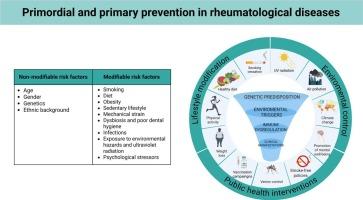Primordial and primary prevention in rheumatological diseases: The time has come
IF 8.3
1区 医学
Q1 IMMUNOLOGY
引用次数: 0
Abstract
Rheumatological, immune-mediated diseases (RDs) impose a substantial global burden, especially on women of working age, resulting in chronic disability and escalating healthcare utilisation. Despite therapeutic advances, the incidence of RDs is rising, and no definitive cure exists. Emerging evidence highlights the potential of early-stage interventions, such as addressing preclinical phases of diseases to delay or prevent disease onset. Modifiable risk factors, such as tobacco use, obesity, diet, infections, mechanical strain, and other environmental exposures (e.g., air pollution and ultraviolet radiation), offer clear targets for intervention. Despite increasing efforts in producing high-quality studies for each rheumatological condition, current evidence supports the global promotion of a healthy lifestyle with a balanced diet, regular physical activity and vaccinations, vitamin D supplementation, and minimisation of excessive infectious, mechanical and psychosocial strain. However, to stimulate stakeholders and policymakers in investing and developing strategies for primary prevention, further interventional trials are warranted on at-risk populations such as first-degree relatives of rheumatological patients and asymptomatic autoantibody carriers. Indeed, besides encouraging experiments in rheumatoid arthritis and psoriatic arthritis, where research has reached the adolescent stage, research in disease interception is still in its infancy for most rheumatological conditions.

风湿病的初级和初级预防:时机已到
风湿病和免疫介导的疾病(rd)给全球,特别是工作年龄妇女造成了沉重的负担,导致慢性残疾和不断增加的医疗保健利用。尽管治疗取得了进步,但rd的发病率正在上升,而且尚无确切的治愈方法。新出现的证据突出了早期干预的潜力,例如处理疾病的临床前阶段,以延迟或预防疾病发作。可改变的危险因素,如烟草使用、肥胖、饮食、感染、机械应变和其他环境暴露(如空气污染和紫外线辐射),为干预提供了明确的目标。尽管在为每一种风湿病进行高质量研究方面做出了越来越多的努力,但目前的证据支持在全球推广健康的生活方式,包括均衡饮食、定期体育活动和接种疫苗、补充维生素D,以及尽量减少过度的传染性、机械性和社会心理压力。然而,为了刺激利益相关者和决策者投资和制定一级预防策略,有必要对风湿患者的一级亲属和无症状自身抗体携带者等高危人群进行进一步的干预性试验。事实上,除了鼓励类风湿关节炎和银屑病关节炎的实验(这些研究已达到青少年阶段)之外,大多数风湿病疾病的疾病拦截研究仍处于起步阶段。
本文章由计算机程序翻译,如有差异,请以英文原文为准。
求助全文
约1分钟内获得全文
求助全文
来源期刊

Autoimmunity reviews
医学-免疫学
CiteScore
24.70
自引率
4.40%
发文量
164
审稿时长
21 days
期刊介绍:
Autoimmunity Reviews is a publication that features up-to-date, structured reviews on various topics in the field of autoimmunity. These reviews are written by renowned experts and include demonstrative illustrations and tables. Each article will have a clear "take-home" message for readers.
The selection of articles is primarily done by the Editors-in-Chief, based on recommendations from the international Editorial Board. The topics covered in the articles span all areas of autoimmunology, aiming to bridge the gap between basic and clinical sciences.
In terms of content, the contributions in basic sciences delve into the pathophysiology and mechanisms of autoimmune disorders, as well as genomics and proteomics. On the other hand, clinical contributions focus on diseases related to autoimmunity, novel therapies, and clinical associations.
Autoimmunity Reviews is internationally recognized, and its articles are indexed and abstracted in prestigious databases such as PubMed/Medline, Science Citation Index Expanded, Biosciences Information Services, and Chemical Abstracts.
 求助内容:
求助内容: 应助结果提醒方式:
应助结果提醒方式:


